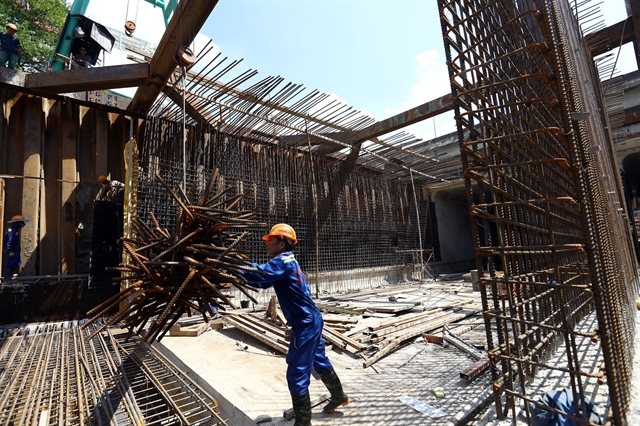 Economy
Economy

 |
| After a long period remaining unchanged, the selling prices of construction steel products on the domestic market have increased four times since the beginning of 2023. — VNA/VNS Photo Huy Hùng |
HÀ NỘI — The selling prices of steel products have increased since the beginning of 2023, increasing the risk of losses for construction contractors.
After a long period of remaining unchanged, the selling prices of construction steel products on the domestic market have increased four times since the beginning of 2023, especially on two consecutive days on January 30 and 31.
On February 8, a number of domestic steel brands increased prices by VNĐ300,000 to VNĐ400,000 per tonne.
Prices surged by VNĐ310,000 per tonne for Hòa Phát steel products in the North to VNĐ15.76 million-VNĐ15.84 million (US$656 - $660) depending on the kinds of products.
Meanwhile, the same products of other brands such as Việt Đức steel, Kyoei, Pomina and VAS also rose by VNĐ300,000-VNĐ310,000 per tonne.
With the current strong increase, many construction enterprises are struggling to renegotiate and re-sign contracts with investors.
With two projects under construction in Đống Đa District, Hà Nội, Trần Văn Hòa, director of Hòa Thành Building Investment and Construction Co, Ltd, said: "The sharp increase in steel prices affects our construction cost. The work is still under construction, forcing us to renegotiate with the investor. If the negotiation is not successful, the construction enterprise will likely face losses."
"Suppliers of construction materials do not sign a long-term steel supply contract. When calling or going to the store to get steel, they will offer the price at that moment," Hòa was quoted as saying to Kinh tế đô thị (Urban Economy) newspaper.
A signed civil construction contract do not include inflation in material prices, so it is difficult to renegotiate, he said.
The construction cost includes materials accounting for 60-70 per cent (building materials such as steel, iron, sand, cement, and stone), labour accounting for 20 per cent, and others, 10 per cent. With the steel price increasing, it is possible that costs rise by at least 10 per cent or more.
Some construction enterprises said that to remove those difficulties, the State management agencies should have solutions to adjust the payment mechanism for building materials of which prices normally see an increase of more than 10 per cent in all types of contracts, and the regional labour coefficient must go with the changes of the current labour market.
There must be solutions to stabilise the price of input materials in the construction industry, Hòa said.
Architect Ngô Tâm from the Covic Construction and Investment Consulting Joint Stock Company said that while construction demand decreases, the costs of materials continue rising according to global prices. That situation puts pressure on civil construction enterprises and public investment projects.
Therefore, he said that the Government needs to stabilise the price of input materials in a timely manner.
If the price of input materials increases too quickly, large construction enterprises will not want to sign contracts for domestic projects and shift to receive foreign-invested projects to make a profit. Small and medium-sized enterprises have a small amount of capital, so they gradually compensate for the loss and then dissolve, said Tâm.
According to experts, the Government removing difficulties for the real estate sector along with increasing the total medium-term public investment in the 2021-25 period to nearly VNĐ2.9 quadrillion, focusing on developing the transport infrastructure system, will cause the demand for construction materials to increase sharply, leading to the price changes until the third quarter of 2023.
The prices of steel products may cool down in the fourth quarter because at that moment, the steel enterprises will have almost completed the year's plan and adjust the production plan for 2024.
To limit the impacts of the steel price increase, the State management agencies need to issue guidelines relating to the production and consumption of building materials, and solutions on stabilising construction materials prices, targeting sustainable development of the steel industry, Tùng said. — VNS